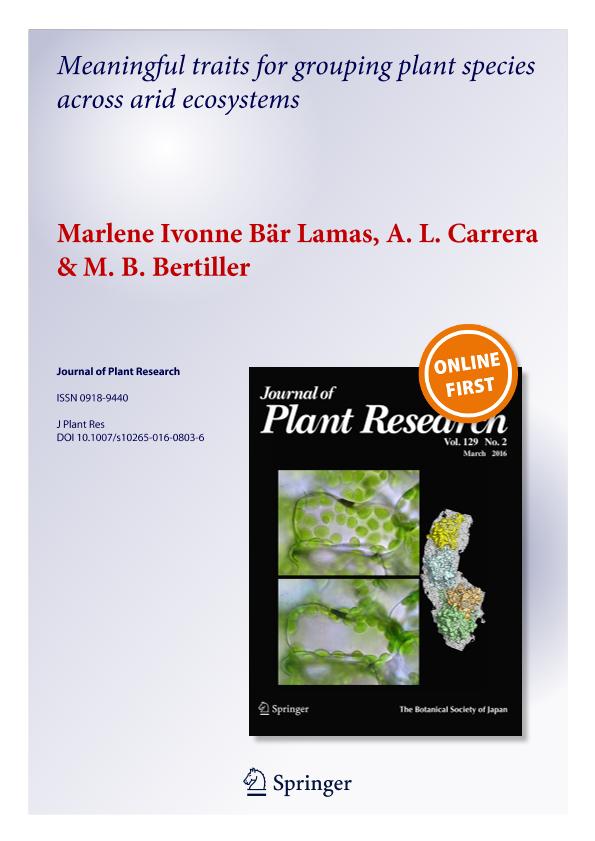Mostrar el registro sencillo del ítem
dc.contributor.author
Bar Lamas, Marlene Ivonne

dc.contributor.author
Carrera, Analía Lorena

dc.contributor.author
Bertiller, Monica Beatriz

dc.date.available
2018-03-20T14:37:07Z
dc.date.issued
2016-05
dc.identifier.citation
Bar Lamas, Marlene Ivonne; Carrera, Analía Lorena; Bertiller, Monica Beatriz; Meaningful traits for grouping plant species across arid ecosystems; Springer Tokyo; Journal of Plant Research; 129; 3; 5-2016; 449-461
dc.identifier.issn
0918-9440
dc.identifier.uri
http://hdl.handle.net/11336/39337
dc.description.abstract
Grouping species may provide some degree of simplification to understand the ecological function of plants on key ecosystem processes. We asked whether groups of plant species based on morpho-chemical traits associated with plant persistence and stress/disturbance resistance reflect dominant plant growth forms in arid ecosystems. We selected twelve sites across an aridity gradient in northern Patagonia. At each site, we identified modal size plants of each dominant species and assessed specific leaf area (SLA), plant height, seed mass, N and soluble phenol concentration in green and senesced leaves at each plant. Plant species were grouped according with plant growth forms (perennial grasses, evergreen shrubs and deciduous shrubs) and plant morphological and/or chemical traits using cluster analysis. We calculated mean values of each plant trait for each species group and plant growth form. Plant growth forms significantly differed among them in most of the morpho-chemical traits. Evergreen shrubs were tall plants with the highest seed mass and soluble phenols in leaves, deciduous shrubs were also tall plants with high SLA and the highest N in leaves, and perennial grasses were short plants with high SLA and low concentration of N and soluble phenols in leaves. Grouping species by the combination of morpho-chemical traits yielded 4 groups in which species from one growth form prevailed. These species groups differed in soluble phenol concentration in senesced leaves and plant height. These traits were highly correlated. We concluded that (1) plant height is a relevant synthetic variable, (2) growth forms adequately summarize ecological strategies of species in arid ecosystems, and (3) the inclusion of plant morphological and chemical traits related to defenses against environmental stresses and herbivory enhanced the potential of species grouping, particularly within shrubby growth forms.
dc.format
application/pdf
dc.language.iso
eng
dc.publisher
Springer Tokyo

dc.rights
info:eu-repo/semantics/openAccess
dc.rights.uri
https://creativecommons.org/licenses/by-nc-sa/2.5/ar/
dc.subject
Desert Plants
dc.subject
N Concentration
dc.subject
Plant Height
dc.subject
Seed Mass
dc.subject
Soluble Phenols
dc.subject
Specific Leaf Area
dc.subject.classification
Otras Ciencias Biológicas

dc.subject.classification
Ciencias Biológicas

dc.subject.classification
CIENCIAS NATURALES Y EXACTAS

dc.title
Meaningful traits for grouping plant species across arid ecosystems
dc.type
info:eu-repo/semantics/article
dc.type
info:ar-repo/semantics/artículo
dc.type
info:eu-repo/semantics/publishedVersion
dc.date.updated
2018-03-12T14:24:40Z
dc.journal.volume
129
dc.journal.number
3
dc.journal.pagination
449-461
dc.journal.pais
Japón

dc.journal.ciudad
Tokyo
dc.description.fil
Fil: Bar Lamas, Marlene Ivonne. Consejo Nacional de Investigaciones Científicas y Técnicas. Centro Científico Tecnológico Conicet - Centro Nacional Patagónico. Instituto Patagónico para el Estudio de los Ecosistemas Continentales; Argentina. Universidad Nacional de la Patagonia; Argentina
dc.description.fil
Fil: Carrera, Analía Lorena. Consejo Nacional de Investigaciones Científicas y Técnicas. Centro Científico Tecnológico Conicet - Centro Nacional Patagónico. Instituto Patagónico para el Estudio de los Ecosistemas Continentales; Argentina. Universidad Nacional de la Patagonia; Argentina
dc.description.fil
Fil: Bertiller, Monica Beatriz. Consejo Nacional de Investigaciones Científicas y Técnicas. Centro Científico Tecnológico Conicet - Centro Nacional Patagónico. Instituto Patagónico para el Estudio de los Ecosistemas Continentales; Argentina. Universidad Nacional de la Patagonia; Argentina
dc.journal.title
Journal of Plant Research

dc.relation.alternativeid
info:eu-repo/semantics/altIdentifier/doi/http://dx.doi.org/10.1007/s10265-016-0803-6
dc.relation.alternativeid
info:eu-repo/semantics/altIdentifier/url/https://link.springer.com/article/10.1007%2Fs10265-016-0803-6
Archivos asociados
